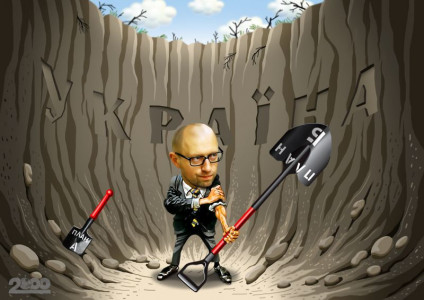Original written by Aleksandr Rodzhers and published by Zhurnalistskaya Pravda; translated from Russian by J.Hawk
While UN is reverberating with speeches, spiders trapped in the Ukrainian jar are continuing to devour one another (this time it’s Kaplin who, at Poroshenko’s behest, is accusing Yatsenyuk of accepting bribes), and events continue to unfold.
With almost nobody taking notice, the International Swap and Derivative Association (ISDA) whose membership includes several dozen of the world’s biggest banks, decided to prepare for the issuing of credit default swaps (CDS) on Ukraine’s debt.
CDS are, in effect, insurance mechanisms under which the insurer undertakes the responsibility to return the credit issued by the “buyer” to the third party–the “base borrower”, in the event some “credit event” ( for example, forcible restructurization, a payment moratorium, or a bankruptcy).
In this instance, the creditors are receiving protection against credit risk, the insurance on credits issued earlier or on purchased debt instruments. In the event of a default, the “buyer” shall transfer the “purchaser” the debt instruments of the “base borrower”, and in return will receive from the “purchaser” monetary compensation equal to the nominal value of the debt.
In other words, ISDA believes that the ten days since the fact of Ukraine’s non-payment on a $500 million credit (which should have been paid on September 23) will expire on October 3, which will trigger the default procedure.
Should that happen, there will be an accelerated auction which will determine the amount of CDS payouts, after which the ultimate beneficiaries of Ukrainian sovereign and state-guaranteed securities will be able to receive their insurance payments, and their debt instruments will be passed on to the insurers.
The preliminary auction is planned for October 6, and the final one for October 8. The obligations will be considered in relation to all sovereign eurobonds, including the “Russian” ones which total $3 billion, and the state-guaranteed Ukrainian eurobonds issued by the “Infrastructure Project Financing” state corporation.
Ignorance leads to suppositions, while knowledge allows one to forecast standard procedures with a fair degree of accuracy. This pertains to the question whether Ukraine can avoid not paying Russia–in this instance, the insurance automatically returns Russia the whole sum of the debt, which then becomes the property of the insurers.
And these are entirely different folks from various BNP Paribas, JP Morgan, Barclays, Goldman Sachs International, and similar firms. Which are fully intent to implement a default procedure against Ukraine.
But whereas Argentina had a patriotic government which offered all manner of resistance to the creditors’ efforts to plunder their country, in Ukraine Yatsenyuk will deliver everything personally. Due to his servile and mercenary nature.
J.Hawk’s Comment: The one aspect of Rodzhers’ analysis that begs further scrutiny is who, exactly, are the owners of Ukraine’s credit default swaps. Given that it’s preferable for a CDS owner not to be stuck owning the debt following the default (it still remains to be seen how much recoverable property Ukraine has in foreign countries), two things appear to be evident.
1. The owners of the default swaps are less influential politically than the actual creditors, who effectively prevented the restructurization and shifted the burden of Ukraine’s failing economy onto the CDS owners.
2. The owners of the default swaps have a major incentive to strenuously lobby on behalf of Ukraine in order to convince Western governments to throw money at that country.
There is one individual that fits both of these descriptions, and that happens to be the West’s favorite liberal vulture oligarch, George Soros, who clearly seems to have a major financial stake in Ukraine (otherwise what explains his obsession with that particular country???), even though he is not the country’s creditor nor a private investor. It would appear that Soros made a bet, possibly in collusion with Poroshenko (it would be interesting to see exactly who was on the receiving end of Soros’ “democracy promotion” funds in Ukraine) that once Poroshenko provokes a conflict with Russia, the West will have no choice but to finance Ukraine to the tune of tens of billions of dollars, which would make Soros’ rather dubious investment in Ukrainian credit default swaps look positively brilliant in retrospect.
But that’s not how things worked out, have they?






